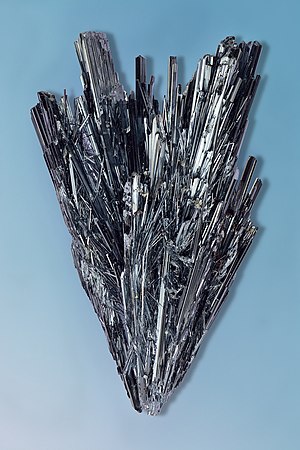Talk:Stibnite
| This It is of interest to the following WikiProjects: | |||||||||||
| |||||||||||
Metal ??
[edit]This mineral is described as a source of "the rare metal antimony". Is it appropriate to describe antimony as a metal? Although it has some metallic properties, I thought it belonged to the same group as phosphorus and arsenic.Mike Shepherd 20:43, 27 August 2007 (UTC)(Antimony is a Metalloid, The only reasons is its Reactivity-non-metallic.
- I changed the wording from metal to metalloid. --Kevmin 21:40, 27 August 2007 (UTC)
Stibnite in Kohl
[edit]Isn't it Galena, not Stibnite, in Kohl? Galena and Kohl articles say so. 167.220.26.215 (talk) 17:08, 13 August 2014 (UTC)
When is it a semiconductor
[edit]Electrolysis of a molten semiconductor calls it a 'molten semiconductor'. Is it a semiconductor (with a band gap) in the solid or molten state (or is it just a poor conductor) ? - Rod57 (talk) 12:52, 7 October 2018 (UTC)
Featured picture scheduled for POTD
[edit]Hello! This is to let editors know that File:Stibnite -_Herja_mine,_Maramures,_Romania.jpg, a featured picture used in this article, has been selected as the English Wikipedia's picture of the day (POTD) for July 14, 2023. A preview of the POTD is displayed below and can be edited at Template:POTD/2023-07-14. For the greater benefit of readers, any potential improvements or maintenance that could benefit the quality of this article should be done before its scheduled appearance on the Main Page. If you have any concerns, please place a message at Wikipedia talk:Picture of the day. Thank you! — Amakuru (talk) 10:04, 5 July 2023 (UTC)

|
Stibnite, also known as antimonite, is a sulfide mineral with the formula Sb2S3. This soft grey material crystallizes in an orthorhombic space group. Pastes of stibnite powder in fat or other materials have been used since at least 3000 BC as eye cosmetics in the Mediterranean and farther afield; in this use, it is called kohl. It was used to darken the brows and lashes, or to draw a line around the perimeter of the eye. Stibnite is also the most important industrial source for the metalloid antimony. This stibnite crystal, measuring 5.0 cm × 2.8 cm × 1.5 cm (1.97 in × 1.10 in × 0.59 in), was found in the Herja Mine in Maramureș, Romania. Photograph credit: Ivar Leidus
Recently featured:
|

